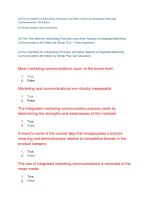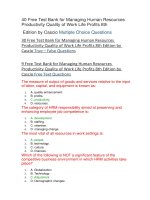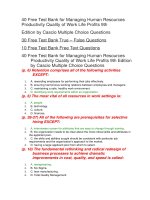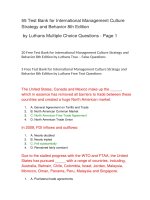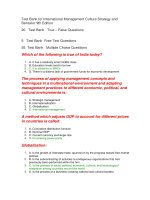80 test bank for managing human resources productivity quality of work life profits 9th
Bạn đang xem bản rút gọn của tài liệu. Xem và tải ngay bản đầy đủ của tài liệu tại đây (104.19 KB, 16 trang )
40 Free Test Bank for Managing Human Resources
Productivity Quality of Work Life Profits 9th
Edition by Cascio Multiple Choice Questions
30 Free Test Bank True – False Questions
10 Free Test Bank Free Text Questions
40 Free Test Bank for Managing Human Resources
Productivity Quality of Work Life Profits 9th Edition
by Cascio Multiple Choice Questions
(p. 6) Retention comprises all of the following activities
EXCEPT:
1.
2.
3.
4.
A. rewarding employees for performing their jobs effectively.
B. ensuring harmonious working relations between employees and managers.
C. maintaining a safe, healthy work environment.
D. identifying work requirements within an organization.
(p. 6) The most vital of all resources in work settings is:
1.
2.
3.
4.
A. people.
B. technology.
C. culture.
D. finances.
(p. 26-27) All of the following are prerequisites for selective
hiring EXCEPT:
1.
2.
A. interviewers screen for attributes that are easy to change through training.
B. the organization needs to be clear about the most critical skills and attributes in
the applicant pool.
3. C. the skills and abilities sought should be consistent with particular job
requirements and the organization's approach to the market.
4. D. having a large applicant pool from which to select.
(p. 18) The fundamental rethinking and radical redesign of
business processes to achieve dramatic
improvements in cost, quality, and speed is called:
1.
2.
3.
4.
A. reengineering.
B. Six Sigma.
C. lean manufacturing.
D. Total Quality Management.
(p. 5) Which of the following is a characteristic of a 21stcentury corporation as compared to a 20th-century
corporation?
1.
2.
3.
4.
A. Focus is internal
B. Style is structured
C. Mass production of products
D. Strategy is bottom-up
(p. 6) Staffing is comprised of all the following activities
EXCEPT:
1.
2.
3.
4.
A. identifying work requirements within an organization.
B. involving employees in business strategy.
C. recruiting, selecting, and promoting qualified candidates.
D. determining the numbers of people and the skills necessary to do the work.
(p. 24) According to the text, quality of work life is defined in
terms of:
1.
2.
3.
4.
A. employee perceptions of their well-being at work.
B. the level of productivity achieved by employees.
C. objective indices of employee well-being at work.
D. the degree to which an organization adopts Japanese managerial principles.
(p. 3) Many factors are driving change, but none is more
important than the rise of:
1.
2.
3.
4.
A. Internet technologies.
B. women in the workforce.
C. human resource professionals.
D. cultural diversity.
(p. 7) A broad objective of HRM is to _____ of all workers in
the organization.
1.
2.
3.
4.
A. minimize the downtime
B. optimize the usefulness
C. scrutinize the personnel file
D. standardize the benefits
(p. 6) All of the following are general categories of HRM
activities EXCEPT:
1.
2.
3.
4.
A. managing change.
B. development.
C. outplacement.
D. adjustment.
(p. 15) In a(n) _____, employees operate remotely from each
other and from managers.
1.
2.
3.
4.
A. bureaucratic organization
B. fluid organization
C. telecommuting center
D. virtual workplace
(p. 24) Theoretically, quality of work life (QWL) involves
giving workers the opportunity to make decisions
about the design of their jobs and workplaces, and
what they need to make products or to deliver services
most effectively. What workers want varies by country.
Chinese workers value:
1.
2.
3.
4.
A. chances to learn.
B. competitive base pay.
C. challenging work.
D. work/life balance.
(p. 8) When senior managers take true ownership of their
responsibility to have the right people in critical
leadership roles, they are embracing their role of:
1.
2.
3.
4.
A. Morale supervisors
B. Technical training specialists
C. Chief Talent Officers
D. Applied motivational strategist
(p. 25 ) _____ are HR professionals who ensure today's and
tomorrow's talent, shape the organization, foster
communication, and design reward systems.
1.
2.
3.
4.
A. Cultural stewards
B. Credible activists
C. Strategy architects
D. Organizational designers
(p. 21) The measure of output of goods and services relative
to the input of labor, capital, and equipment is known
as:
1.
2.
3.
4.
A. quality enhancement.
B. profits.
C. productivity.
D. resources.
(p. 10) How do less-developed countries win from
globalization?
1.
2.
3.
4.
A. They can sell sophisticated technologies to emerging economies.
B. They get jobs making low-cost products for rich countries.
C. They gain the ability to buy expensive imports.
D. They can sell services to relatively under-developed countries.
(p. 10) Examples of how globalization of companies has
affected the economy include
1.
2.
3.
4.
A. Open boarders have allowed new ideas and technology to flow freely
B. Accelerating productivity growth has allowed companies to be more competitive
C. There is a growing fear that globalization only benefits big business
D. All of the above
(p. 27) The fundamental premise of high-performance
management systems is that organizations perform at
a higher level when they are able to tap the ideas,
skills, and efforts of all of their people. This is a
dimension of:
1.
2.
3.
4.
A. employment security.
B. reduced differences in status.
C. self-managed teams and decentralization.
D. sharing of information.
(p. 10) Coca Cola earns more than what percent of its
revenues from outside the United States?
1.
2.
3.
4.
A. 5
B. 25
C. 75
D. 95
(p. 9) There is a substantial and growing body of research
evidence showing a strong connection between how
firms _____ and the economic results they achieve.
1.
2.
3.
4.
A. select board members
B. educate their management staff
C. manage their people
D. diversify their product line
(p. 17) According to a study examining restructuring's
effects on profitability and stock returns of 500
representative companies listed on the NYSE, in terms
of profitability, which of the following categories of
companies generated lower returns on assets in the
year prior to the announcement of layoffs, the year
when layoffs occurred, and in the two subsequent
years on a relative basis?
1.
2.
3.
4.
A. Asset upsizers
B. Stable employers
C. Downsizers
D. Upsizers
(p. 15) Companies that outsource work far from their home
countries are said to be:
1.
2.
3.
4.
A. offshoring.
B. onshoring.
C. outsourcing.
D. nearshoring.
(p. 24) Quality of work life (QWL) depends a lot on what
workers want. _____ is the main requirement of
workers in the United States.
1.
2.
3.
4.
A. Career opportunity
B. Competitive base pay
C. Chances to learn
D. Challenging work
(p.18 ) Organizations strive to retain talented workers in a hot
job market by offering employees:
1.
2.
3.
4.
A. coordination of control.
B. flexible work schedules.
C. Total Quality Management.
D. unity of command.
(p. 10) Which factors have contributed to the attractiveness
of globalization?
1.
2.
3.
4.
A. Cheap labor
B. Plentiful resources
C. Ease of travel
D. All of the above
(p. 25) Cultural stewards do all but which of the following:
1.
2.
3.
4.
A. Shape company culture by facilitating change
B. Help employees find meaning in their work
C. Serve as elected representatives of the union
D. Manage work-life effectiveness.
(p. 6) The category of HRM responsibility aimed at
preserving and enhancing employee job competence
is:
1.
2.
3.
4.
A. development.
B. staffing.
C. retention.
D. managing change.
(p. 8) In terms of staffing, the responsibility of line
management is:
1.
2.
3.
4.
A. making final decisions on entry-level hires and promotions.
B. doing a job/competency analysis.
C. the development of legally sound performance management systems.
D. investigation of employee complaints.
(p. 14) Which of the following was NOT part of the "Three-C"
logic that dominated industrial society's approach to
organizational design throughout the nineteenth and
twentieth centuries?
1.
2.
3.
4.
A. Coordination
B. Command
C. Control
D. Compartmentalized information
(p. 5) The challenge, opportunity, and also the frustration of
creating and managing organizations frequently stem
from the _____ problems that arise within them.
1.
2.
3.
4.
A. people-related
B. union
C. legal
D. upper management
(p. 11) Globalization has been encouraged by
1.
2.
3.
4.
A. the ease of travel and communication
B. the decrease in employees willing to take foreign posts
C. the complexity of matrix organizations
D. a lack of global resources
(p. 18) Organizations known for the quality of their products
and services strongly believe that _____ are the key to
those results.
1.
2.
3.
4.
A. eminent board members
B. virtual organizations
C. employees
D. outstanding HR managers
(p. 6) _____ comprises activities intended to maintain
compliance with the organization's HR policies and
business strategies.
1.
2.
3.
4.
A. Staffing
B. Retention
C. Development
D. Adjustment
(p. 17) The goal of _____ is to reduce variability from a
process (no more than 3.4 defects per million) in order
to avoid errors and increase predictability.
1.
2.
3.
4.
A. ISO 13485
B. Total Quality Management
C. ISO 9000
D. Six Sigma
(p. 8) . (p. 8) Which of the following is a retention
responsibility of the line management?
1.
2.
3.
4.
A. Compensation and benefits
B. Performance feedback to subordinates
C. Management and organizational development
D. Face-to-face resolution of conflict
(p. 8) Ron is a senior production manager at an avionics
product research and development organization.
Which of the following would be part of Ron's
responsibility for managing change?
1.
2.
3.
4.
A. Providing a vision of where his unit is going.
B. Providing expertise to facilitate the overall process of managing change.
C. Developing legally sound performance management systems.
D. Respecting the dignity of each individual in his unit.
(p. 18) It generally takes _____ before quality-management
programs become institutionalized.
1.
A. six months
2.
3.
4.
B. three to five years
C. five to ten years
D. ten to fifteen years
(p. 3) The 21st-century corporation must adapt itself to
management via the Web and must be:
1.
2.
3.
4.
A. predicated on stability.
B. organized around rigid hierarchies.
C. built on shifting partnerships and alliances.
D. constructed on bricks and mortar.
(p. 12) The most important intellectual property in the
creative economy is:
1.
2.
3.
4.
A. intellectual capital
B. telemedicine
C. music
D. software
(p. 24) _____ involves giving workers the opportunity to
make decisions about the design of their jobs and
workplaces, and what they need to make products or
to deliver services most effectively.
1.
2.
3.
4.
A. ISO
B. reengineering
C. Six Sigma
D. QWL
30 Free Test Bank for Managing Human Resources
Productivity Quality of Work Life Profits 9th Edition
by Cascio True - False Questions
(p. 24 ) Over the past decade, organizations have become
more complex, dynamic, and fast-paced.
1.
2.
True
False
(p. 18) Reengineering is the fundamental rethinking and
radical redesign of business processes to achieve
dramatic improvements in cost, quality, and speed.
1.
2.
True
False
(p. 3) The advantage of bringing breakthrough products to
market first will be shorter than ever because
globalization will let competitors match or exceed
them almost instantly.
1.
2.
True
False
(p. 7) Changes in any single part of the HRM system have a
reverberating effect on all other parts of the system.
1.
2.
True
False
(p. 4) The new global corporation might be based in the
United States but do its software programming in Sri
Lanka, its engineering in Germany, and its
manufacturing in China.
1.
2.
True
False
(p. 11) Trends will include a decrease in automated and
outsources roles, more diversity of employees, and an
increased importance on technical skills for
successful mangers.
1.
2.
True
False
(p. 12) Globalization is a fact of organizational life, as
countries, companies, and workers are interconnected
as never before.
1.
2.
True
False
(p. 10) There is a growing fear among many people that
globalization benefits big companies instead of
average citizens - of America or any other country.
1.
2.
True
False
(p. 21) When productivity increases, businesses can pay
higher wages without boosting inflation.
1.
2.
True
False
(p.14 ) In the 21st century, employers are enjoying an
abundance of skilled help.
1.
2.
True
False
(p. 10 ) Cheap labor and plentiful resources, along with ease
of travel and communication, have created global labor
markets.
1.
2.
True
False
(p. 22) Company X is increasing production by adding more
employees to its workforce and scaling up its existing
facilities. Company X is essentially increasing its
productivity.
1.
2.
True
False
(p. 19) "Business-based flexibility" is characterized by
private deals based on individual's needs.
1.
2.
True
False
(p. 6) Managing change is an ongoing process whose
objective is to enhance the ability of an organization to
anticipate and respond to developments that are only
in its external environment.
1.
2.
True
False
(p. 18) A process is a collection of activities that takes one or
more kinds of input and creates an output that is of
value to a customer.
1.
2.
True
False
(p. 3) The focus for the 21st century organization is far more
likely to look like a web: a flat, intricately woven form
that links partners, employees, external contractors,
suppliers, and customers in various collaborations.
1.
2.
True
False
(p. 8) Recognizing that you have the right people in critical
leadership roles is not an HR responsibility, but rather
a business imperative which must be truly owned by
the leaders of the firm.
1.
2.
True
False
(p. 9) One study found that a 10 percent increase in a
measure of goal-setting activity of firms was
associated with a six percent increase in industry
adjusted stock returns.
1.
2.
True
False
(p. 7) The functional areas of HRM (staffing, retention, etc.)
are the sole responsibility of the HR department.
1.
2.
True
False
(p. 24) Quality of work life is defined in terms of management
perceptions of employee physical and mental wellbeing at work.
1.
2.
True
False
(p. 17) The best way for a company to gain long time
prosperity is to downsize.
1.
2.
True
False
(p. 25 ) Strategy architects administer the day-to-day work of
managing people by implementing workplace policies
and advancing HR technology.
1.
2.
True
False
(p. 18) Flexibility is currently viewed by most managers and
employees as a new and effective way of working to
achieve business results, rather than as an exception
or employee accommodation.
1.
2.
True
False
(p. 15) Modular corporations retain all major business
functions under one roof.
1.
2.
True
False
(p. 13 ) Big advertisers are increasingly moving away from
pay per click online advertising, as they are prone to
manipulation.
1.
2.
True
False
(p. 8) One of the greatest challenges of Chief HR officers is
creating a true sense of ownership among senior
leaders as to their role of Chief Talent Officers.
1.
2.
True
False
(p. 28) The sharing of information on such things as financial
performance, strategy, and operational measures
conveys to an organization's people that they are
trusted.
1.
2.
True
False
(p. 17) If the findings of the study that examined
restructuring's effects on 500 representative
companies listed on the NYSE is assumed to hold
good in future, a company that downsizes now will
yield stock returns significantly higher than those of
upsizers or stable employers.
1.
2.
True
False
(p.16 ) Downsizing is probably the most common form of
restructuring.
1.
2.
True
False
(p. 17) Originally invented as a way to improve quality, Six
Sigma's main value to corporations today lies in its
ability to save time and money.
1.
2.
True
False
10 Free Test Bank for Managing Human Resources
Productivity Quality of Work Life Profits 9th Edition
by Cascio Free Text Questions
(p. 9 -13) List and explain three characteristics of the
evolving competitive environment for business.
Answer Given
Globalization: At its core, the globalization of business refers to the free movement
of capital, goods, services, ideas, information, and people across national
boundaries. Open borders have allowed new ideas and technology to flow freely
around the globe, accelerating productivity growth, and allowing companies to be
more competitive than they have been in decades. Yet there is a growing fear on
the part of many people that globalization benefits big companies instead of
average citizens, as stagnating wages and growing job insecurity in developed
countries create rising disenchantment Technology: Modern technology is
changing the ways we live and work. The information revolution will transform
everything it touches. Information and ideas are keys to the new creative economy
because everyone depends increasingly on knowledge. Fortunately, history shows
that technology-driven job destruction does not decrease overall employment—
even while making some jobs obsolete. E-Commerce: Electronic commerce (ecommerce) encompasses a very wide range of business activities and processes,
from e-banking to offshore manufacturing to e-logistics. In fact, the ever-growing
dependence of modern industries on electronically enabled business processes
gave impetus to the growth and development of supporting systems, for example,
broadband and fiber-optic networks, supply-chain management software,
customer-relationship management software, inventory-control systems, and
financial-accounting software.. E-commerce companies understand what
consumers want and they deliver it at a growing rate. The internet has also
become a major factor in pricing strategy.
(p. 17) Write a short note on Six Sigma.
Answer Given
Six Sigma is one of the best known quality-management programs. Six Sigma
originated at Motorola in 1986, and became a staple of corporate life in the 1990s
after it was embraced by GE. Its goal is to reduce variability from a process (no
more than 3.4 defects per million) in order to avoid errors (defects) and increase
predictability. It is based on five steps: define, measure, analyze, improve, and
control (or DMAIC). Originally invented as a way to improve quality, Six Sigma's
main value to corporations today lies in its ability to save time and money. Yet
there is an inherent tension between innovation and efficiency. Whereas process
excellence demands precision, consistency, and repetition, innovation calls for
variation, failure, and serendipity. As the emphasis shifts to today's idea-based,
creative economy, Six Sigma may be less appropriate in companies like Google
and 3M, which have the long-term strategy to dream up innovations.
(p. 24) Define what is meant by quality of work life and list
some aspects of successful QWL programs.
Answer Given
There are two ways of looking at what quality of work life (QWL) means. One way
equates QWL with a set of objective organizational conditions and practices. The
other way equates QWL with employees' perceptions that they are safe and
relatively well satisfied, they have reasonable work-life balance, and they are able
to grow and develop as human beings. This way relates QWL to the degree to
which the full range of human needs is met. In many cases, these two views
merge: Workers who like their organizations and the ways their jobs are structured
will feel that their work fulfills them. In such cases, either way of looking at one's
quality of work life will lead to a common determination of whether a good QWL
exists. However, because people differ and because the second view is quite
subjective—it concedes, for example, that not everyone finds such things as
democratic decision making and telework to be important components of a good
QWL—QWL will be defined in terms of employees' perceptions of their physical
and mental well-being at work. In theory, QWL is simple: It involves giving workers
the opportunity to make decisions about the design of their jobs and workplaces,
and what they need to make products or to deliver services most effectively. Of
course, what workers want may vary by country.
(p. 12) List at least three human resource aspects that
greatly benefit from vendor HRIS applications (e.g.,
benefits enrollment).
Answer Given
Any three of the following: 1) applicant tracking, 2) time and attendance records,
3) training and development, 4) payroll, 5) pension plans, 6) employee surveys.
(p. 21) What is productivity?
Answer Given
Productivity is a measure of the output of goods and services relative to the input
of labor, capital, and equipment. Improving productivity simply means getting more
out of what is put in. It does not mean increasing production through the addition
of resources, such as time, money, materials, or people. It is doing better with
what you have is not working harder; it is working smarter. Today’s world demands
that we do more with less.
(p. 15) List at least two jobs ideally suited for virtual
workplaces.
Answer Given
Any two of the following: 1) sales, 2) marketing, 3) project engineering, 4)
consulting.
(p. 24) What does QWL stand for?
Answer Given
Quality of Work Life
(p. 6) List and describe the five broad activities
encompassed by HRM.
Answer Given
The following activities constitute the HRM system: Staffing comprises the
activities of (1) identifying work requirements within an organization, (2)
determining the numbers of people and the skills mix necessary to do the work,
and (3) recruiting, selecting, and promoting qualified candidates. Retention
comprises the activities of (1) rewarding employees for performing their jobs
effectively, (2) ensuring harmonious working relations between employees and
managers, and (3) maintaining a safe, healthy work environment. The objective of
development is to preserve and enhance employees' competence in their jobs
through improving their knowledge, skills, abilities, and other characteristics.
Adjustment comprises activities intended to maintain compliance with the
organization's HR policies and business strategies. Managing change is an
ongoing process whose objective is to enhance the ability of an organization to
anticipate and respond to developments in its external and internal environments,
and to enable employees at all levels to cope with the changes.
(p. 3) What growing trend will result in waves of
individualized products and services, as well as huge
savings for companies, which will no longer have to
guess what and how much customers want?
Answer Given
Mass customization
(p. 15) Explain at least three new organizational forms.
Answer Given
One example of a new organizational form that is evolving from changes is the
virtual organization, where teams of specialists come together to work on a project
—as in the movie industry—and then disband when the project is finished. Such
organizations are already quite popular in consulting, in legal defense, and in
sponsored research. More common in the information age, however, is the virtual
workplace in which employees operate remotely from each other and from
managers. They work anytime, anywhere—in real space or in cyberspace.
Compelling business reasons, such as reduced real estate expenses, increased
productivity, higher profits, improved customer service, access to global markets,
and environmental benefits drive their implementation. A third example of a new
organizational form is the modular corporation. The basic idea is to focus on a few
core competencies—those a company does best, such as designing and
marketing computers or copiers—and to outsource everything else to a network of
suppliers. Companies are outsourcing work within their home countries (onshore),
near their home countries (near-shore), and far from their home countries
(offshore).

